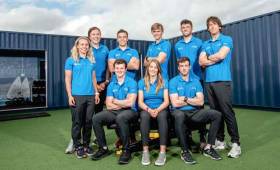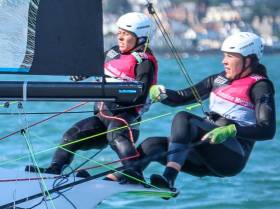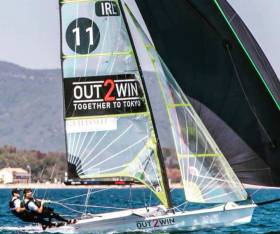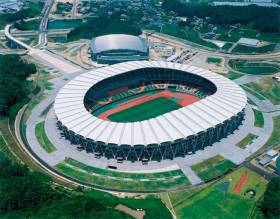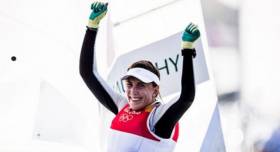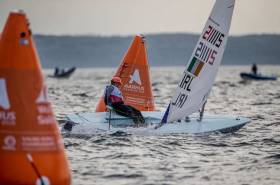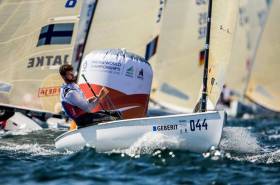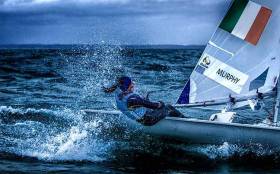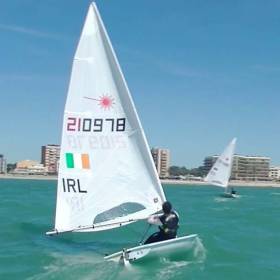Displaying items by tag: Tokyo 2020
Annalise Murphy Leads Celebrations as Irish Sailing 'Performance Headquarters' are Launched at Dun Laoghaire
Irish Sailing unveiled its new €300k 'Performance Headquarters', funded entirely by the Irish Sailing Foundation and located on the grounds of the Commissioners of Irish Lights, at Dun Laoghaire Harbour this morning.
Rio Silver Medalist Annalise Murphy lead the Irish Olympic Sailing team into today's celebrations.
With under 500 days to Tokyo 2020, Minister Mary Mitchell O’Connor, a local Dun Laoghaire TD, was on hand to launch the ‘new home and training centre’ for the team that has yet to qualify for the Olympic Regatta.
Thirteen sailors from throughout Ireland will be based there, including the 2016 Olympic Games silver medallist, her new sailing partner, Katie Tingle, from Cork, and six other world championship medallists.
As well as Murphy and Tingle in attendance today were team members Liam Glynn, Finn Lynch, Aoife Hopkins, Rob Dickson & Sean Waddilove, Ryan Seaton & Seafra Guilfoyle; and training partners Aisling Keller, Ewan McMahon, Tadgh and Sean Donnelly.
As Afloat.ie reported previously, the Performance HQ is entirely mobile and consists of three converted shipping containers which have space for briefings and athlete education, a gym, gear storage and a boat maintenance area. The athlete briefing room can then be shipped directly to international competitions such as the Olympics in Tokyo 2020 and provide a base for our athletes overseas. Outside there is a boat park and a pontoon for launching boats.
Speaking at the launch, Annalise Murphy said: “Having this new base is fantastic. For the first time we have a home, somewhere we know we can train, share experiences and focus as a group on how we can make our sailing performances better. It will be a huge support to our campaigns at international events this year as we look to qualify for the 2020 Tokyo Olympic Games.
“We’ve got a saying, ‘Leave home stronger’, which is there to remind us that we’ve got a home to come back to where we can recover, gain strength and prepare for the next campaign. That’s what the new HQ gives us – it means we don’t need to rely on the nomadic overseas campaigns of the past.”
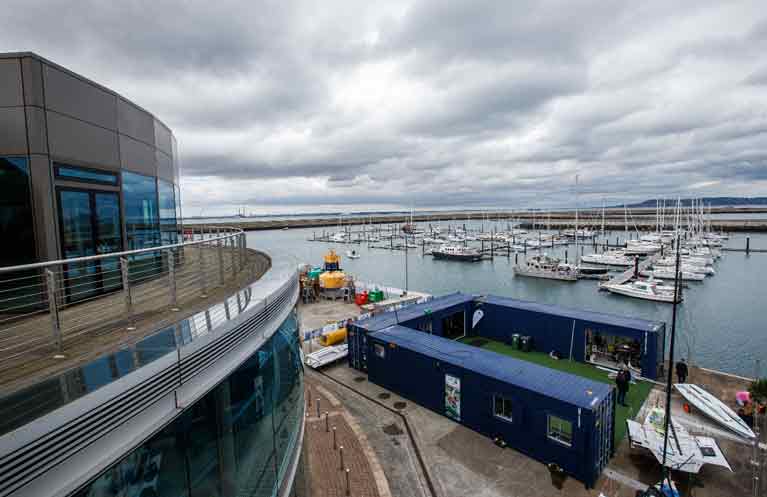 The new Irish Sailing Performance Centre at the Irish Lights Depot
The new Irish Sailing Performance Centre at the Irish Lights Depot
The new HQ will improve both training and educational opportunities for the sailors. It has been instituted with the specific aim of maximising Ireland’s medal potential in international competitions and qualifying for next year’s Olympic Games in Tokyo.
Rory Fitzpatrick, Irish Sailing Performance Head Coach, said that it represents a massive step forward on the journey to medal-winning success for Irish Sailing.
He said: “We will finally have a place we can call ‘home’ and for that reason alone the impact of the new Irish Sailing Performance HQ cannot be underestimated. The environment created will allow for consistent coaching, a base for equipment and our own direct access to the water, which all adds up to giving our athletes the best opportunities to reach their maximum medal-winning potential in the long-term.
This is a major milestone for Irish performance sailing. The new HQ clearly demonstrates the positive impact philanthropy can have on a sport like sailing. We are delighted that private individuals believe in our vision of delivering consistent medal success for Ireland on the world stage”.
The new HQ was officially opened today by Mary Mitchell O’Connor, Minister of State for Higher Education. Ms Mitchell O’Connor commented: “I have no doubt that with this terrific new facility, Irish sailors will be stronger as a squad and be better positioned than ever before to mount successful campaigns at international events in 2019 and beyond, including at the 2020 Tokyo Olympic Games. I would like to wish the senior squad the best of luck and look forward to them building on the incredible international success they have experienced up to now. “
The CEO of Irish Sailing, Harry Hermon, added: “The creation of the Performance HQ is great news – there is no doubt that we’re at the beginning of a new chapter in the story of Irish Sailing, delivering on the medal-winning potential that the facility will help shape and focus. Clearly, however, this new home for the Performance team would not have been possible without the generosity and far-sightedness of those who, through the Irish Sailing Foundation, funded the project.
Competitive sailing requires incredible dedication and sacrifice from the athletes, their families and supporters, and Irish Sailing and its chances of success on a global stage rely on the vision and philanthropy of a group of individuals to whom we are extremely grateful.”
Sailors currently at the Performance HQ
49erFX – Women’s double-hander
Annalise Murphy & Katie Tingle
49er skiff – Men’s double-hander
Ryan Seaton & Seafra Guilfoyle
Robert Dickson & Sean Waddilove
Sean & Tadgh Donnelly (training partners)
Laser Radial – single-hander
Aoife Hopkins
Aisling Keller (training partner)
Laser Standard – single-hander
Liam Glynn
Finn Lynch
Ewan McMahon (training partner)
Read tomorrow on Afloat.ie: Annalise brings stardust to Sutton and the Dickson-Waddilove Tokyo 2020 campaign
Annalise Murphy Back In Training With 49erFX — But Without Sport Ireland Direct Funding
The Irish Times reported earlier this month that Irish Olympic medallist Annalise Murphy no longer has her direct funding support from Sport Ireland.
Performance in competition is a prerequisite for the €40,000-per-annum support under the international carding scheme, also known as the ‘podium’ grand.
However, 29-year-old Annalise moved on from the Laser Radial class after her silver medal win in Rio in 2016.
She spent a number of months in 2017 and 2018 sailing in the Volvo Ocean Race before taking up the 49erFX with a view to qualifying for the Olympics in Tokyo next year.
Annalise recently resumed winter trials with her new boat in Portugal, joined by sailing partner Katie Tingle now recovered from an arm injury sustained last year.
Their first competition as a duo is expected be the Sailing World Cup series regatta in Genoa, Italy this April.
And both will continue to be supported by Irish Sailing, with high performance director James O’Callaghan saying: “The important thing is that [Annalise is] full on campaigning for Tokyo, and we’re delighted to have her back.”
The Irish Times has more on the story HERE.
Trofeo Princesa Regatta Beckons for Irish Olympic Sailing Team
Next up for Irish Olympic sailors still seeking the speed to qualify for Tokyo 2020 Olympics is March's Trofeo Princesa Sofía Iberostar, in Palma, Mallorca one of the most important Olympic Classes regatta in the World and a nominated Irish sailing 2019 qualifying regatta where sailors are required to finish the top half of their respective fleets.
In addition, Irish sailors must also qualify the nation to secure the single berth per country in Tokyo and there is more on that qualification process here.
While there is no official word on who will attend at Palma, it is understood, subject to injury, Ireland will field all its current trialists and some Irish are already entered on the official regatta website here.
- Laser Standard – Finn Lynch, Liam Glynn, Ewan McMahon
- Laser Radial – Aoife Hopkins, Aisling Keller
- Men’s 49er skiff – Ryan Seaton and Seafra Guilfoyle, Robert Dickson and Sean Waddilove, Sean Donnelly and Tadgh Donnelly
- Women’s 49erFX – Annalise Murphy and Katie Tingle.
- Two campaigns (Fionn Lyden and Oisin McClelland) in the men’s heavyweight single-handed event operate independently of Irish Sailing
Gender Equality at Trofeo Princesa
The Majorcan regatta begins the implementation of the gender equality requirements demanded by the International Olympic Committee.
The Trofeo Princesa Sofía Iberostar, one of the most important Olympic Classes regatta in the World, sets the trend once again and becomes the first sailing event to apply the gender equality criteria requested by the International Olympic Committee. The first step will be made at the 50th-anniversary edition of the Balearic event with the introduction of mixed teams in the two-person 470 class.
From 29th March to 6th April around one thousand sailors from approximately 55 nations will meet in the bay of Palma, distributed in the traditional ten Olympic fleets. But in this edition, the 470 Men and Women will be joined by the 470 Mixed, with crews formed by one male and one female, acting either as skipper or crew.
This new category that will sail with the 470 men at the Sofia Iberostar will have its world debut in Majorcan waters. It will be the first key test towards the Paris 2024 Olympics where, for the first time, it will be included in the Olympic programme following the IOC guidelines to foster gender equality in sport.
“It is an honour and pride for the Sofía Iberostar to be pioneers once again thanks to the close relationship with the classes and sailors which has resulted in the regatta being known as the “the sailors’ regatta”- points out Ferran Muniesa, the event General Manager-. The request to introduce the mixed event came from the International 470 Class with the purpose of offering teams the chance to start testing at events with views to Paris 2024”.
Therefore, the first 470 mixed teams, mostly youth teams from nations such as Great Britain, Switzerland and Spain, among others, will take a chance in the new category six years away from the Olympic target. They will have to overcome many obstacles along the way, the first of them being to find the balance on board with the new crew.
“We have already seen in the Nacra 17, also a mixed event, that it is not always easy to have mixed male and female teams due to an important psychological factor. But the IOC is determined to boost gender equality in sport and the Sofia Iberostar supports the concept, aware of the need to configure a fairer and more equal society at all levels, adds Muniesa.
Club Nàutic S’Arenal will be the venue for the 470 fleet at the 50 Trofeo Princesa Sofía Iberostar, together with the Finn, 49er and 49er FX and, as a novelty this year, it will also host the RS:X men and women. Club Marítimo San Antonio de la Playa (venue for the Laser, Laser Radial and Nacra 17) and Real Club Náutico de Palma (ORC and One design) are also organisers and venues of the Majorcan regatta that will celebrate this year half a century of life in a historical edition: at sports level for the exceptional participation expected, both in quantity and quality and in the social area with the celebration of several parallel commemorative events.
Irish Sailing Announce Tokyo 2020 Selection Criteria as Olympic Sailors Seek Country Qualification
Selection criteria for the Tokyo Olympics have been announced by Irish Sailing this week in the knowledge that with 553 days to Tokyo, Ireland has yet to reach country qualification in any class.
Ireland still has to qualify in the men’s single-handed (Laser Standard rig) women’s single-handed (Laser Radial rig), women’s two-person skiff (49er FX) and men’s two-person skiff (49er).
The failure to qualify at the first attempt last year has been attributed in part to a youth component among the current trialists event though veterans Annalise Murphy, Ryan Seaton and Finn Lynch are part of its number.
The Tokyo Olympic trialists are:
- Laser Standard – Finn Lynch, Liam Glynn, Ewan McMahon
- Laser Radial – Aoife Hopkins, Aisling Keller
- Men’s 49er skiff – Ryan Seaton and Seafra Guilfoyle, Robert Dickson and Sean Waddilove, Sean Donnelly and Tadgh Donnelly
- Women’s 49erFX – Annalise Murphy and Katie Tingle.
- Two campaigns (Fionn Lyden and Oisin McClelland) in the men’s heavyweight single-handed event operate independently of Irish Sailing
Injury
Currently, in a training camp in Cadiz, double Olympian Ryan Seaton in the 49er skiff is without his crew following Seafra Guilfoyle's ankle injury sustained in training last November after his trapeze wire broke. It is understood Seaton has been training with both Annalise's own 49erfx crew Katie Tingle (who has returned from injury) and multi-talented Royal St. George Yacht Club stand-in crew Adam Hyland.
"Is the jump up from Under–23 World championship winners too big to secure 49er nomination?"
In theory, all this bodes well for the Howth Yacht Club duo of Robert Dixon and Sean Waddilove with the question now being asked; is the jump up from under–23 World championship winners too big to secure 49er nomination?
Meanwhile, Annalise Murphy's bid in Cadiz is reported to be progressing well with Tingle now back in the boat but the pair have yet to race internationally and time is ticking in an ultra-competitive fleet that is only getting faster the closer we get to Tokyo.
"Could this mean Ireland is looking at possibly one or two Lasers at the Games only?"
Could this mean Ireland is looking at possibly one or two Lasers at the Games only? Even then, the men’s fleet size is much reduced putting extra pressure on both Finn Lynch and Ewan McMahon.
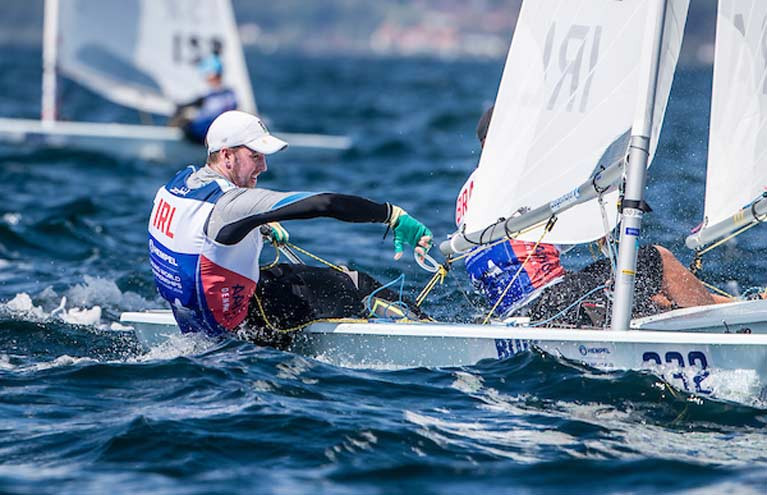 Ireland’s best hope for qualifying for Tokyo at Aarhus was Finn Lynch of the National Yacht Club competing in the Men’s Laser event. Lynch had three top ten results in his score sheet. Photo: Sailing Energy
Ireland’s best hope for qualifying for Tokyo at Aarhus was Finn Lynch of the National Yacht Club competing in the Men’s Laser event. Lynch had three top ten results in his score sheet. Photo: Sailing Energy
The World Sailing Championships at Aarhus, Denmark, last August was the first opportunity to qualify for Tokyo, but Irish crews in three events did not pass the test.
The next qualification opportunity is in July in Japan (Laser classes) and the end of the year for the skiffs in New Zealand, at a cost of over €10,000 to attend.
2020 Olympic Sailing Trials
Once the nation is qualified, Irish selection criteria will apply provided the minimum standard required to justify a trial is reached.
Irish sailing's initial criteria is two candidates finishing top half of one of the 2019 qualifying regattas held at:
- Palma; March 29th-April 6th, 2019,
- Genoa; World Cup Round: April 15th-21st, 2019,
- Hyéres Regatta: April 27th-May 4th, 2019,
- Marseille World Cup Final: June 2nd-9th, 2019,
- Enoshima Test Event: August 15th-22nd, 2019,
- Enoshima World Cup Round: August 25th-September 1st, 2019,
- Event European Championships 2019,
- Event World Championships 2019.
If only one candidate achieves the criteria, the nomination is automatic provided Ireland has been qualified in that event for Tokyo.
If a trial series is required, the combined scores from each of the following trial regattas will be used to decide the nomination:
- Palma: March 28th-April 4th,2020,
- Genoa WC Round and final European Nation Qualifier: April 13th-19th, 2020
- Hyéres Regatta: April 25th-May 2nd, 2020
Download the full IS criteria below
Olympic Federation of Ireland Announce 'Athlete Centred' Partnership with Sport Ireland Institute
The Olympic Federation of Ireland (OFI) and Sport Ireland Institute today announced a ground-breaking, athlete centred partnership agreement for performance support delivery for the period 2018-2022.
The OFI and Sport Ireland also announced that Fukuroi City in Japan will host the Team Ireland pre-Games Training Camp ahead of the Toyko 2020 Olympic Games.
At the launch of the partnership Patricia Heberle was named as the Olympic Federation of Ireland’s Chef de Mission for the European Games 2019 in Minsk, and the Tokyo Olympic Games in 2020. Previously the role of Chef de Mission was recruited internally or on a voluntary basis. This is the first time that it will be a professional, stand-alone role.
The new partnership with Sport Ireland Institute will deliver a comprehensive performance support programme for Team Ireland, covering athlete life-skills, sports science and medicine as well as various Games readiness activities before, during and after Games time.
Previously Irish Olympians did not always have the same medical support care team looking after their needs before, during and after Games. Instead, there was often a handover of care from one medical team to another at Games time. Following feedback from athletes post the Rio Games the OFI and Sport Ireland institute came together to put this new athlete centred support plan in place.
This new partnership aims to align all sport science and medical care so that athletes can perform to their full potential. The OFI and Sport Ireland have agreed to jointly fund this new partnership and it will be delivered through partnership with the OFI, Sport Ireland Institute, the National Governing Bodies and the Performance Directors.
Speaking today, President of the Olympic Federation of Ireland Sarah Keane said,
“Today’s partnership agreement is a major step forward in placing the athlete first and comes at a crucial time as preparations for Tokyo gather pace. Our strategy is clear on the need to deliver for athletes. The appointment of Patricia Heberle as Chef de Mission in a stand-alone professional role, and the provision of Sport Science and Medical care from Sport Ireland Institute practitioners during games time makes this a very important day for High Performance sport in Ireland. Team Ireland is now functioning as a team with the whole system working together seamlessly for our athletes. I want to thank John Treacy and Sport Ireland, as well as my own Board for helping to bring it about.
CEO of Sport Ireland, John Treacy, said
“On behalf of Sport Ireland, we are delighted to see this new aligned approach in the Irish High-Performance System toward Olympic Games preparation and performance. The closer collaboration throughout the Olympic Games four-year cycle between the Olympic Federation of Ireland, Sport Ireland Institute, Sport Northern Ireland and the National Governing Bodies of sport will lead to more effective and targeted use of resources, increased performance support to Team Ireland and provide the all-important continuity of care to athletes. This is a big step forward and we’d like to congratulate all parties involved who have worked very hard to put this partnership in place.”
The Olympic Federation of Ireland today also announced that it has appointed Patricia Heberle as its Chef de Mission for the European Games 2019 in Minsk, and the Tokyo Olympic Games in 2020.
Patricia, a former Australian hockey player, has been working since 2017 for the Olympic Federation of Ireland as its High Performance Lead and has recently been involved in leading the Sparking Performance programme for NGB Performance Directors through the Sport Ireland Institute.
Commenting, Peter Sherrard CEO of the Olympic Federation of Ireland said,
“Today we put in place three vitally important building blocks for the road to Tokyo. Firstly, Patricia Heberle’s appointment brings a wealth of expertise and the respect of Irish High Performance system. She is a key appointment for the Olympic Federation of Ireland as we prepare for the European Games in Minsk next year and the Tokyo Olympic Games in 2020. Secondly, thanks to today’s landmark agreement with Sport Ireland Institute, Patricia will be operating a unified, seamless system, where the needs of the athlete are central and delivered in partnership with the Sport Ireland Institute. Thirdly, we have also identified a very strong pre-games training camp in Fukuroi, Japan. We have done a lot to get to this point but the real work starts now, and on the best possible footing. Together we are determined to deliver for the athletes who represent us on the world stage.”
Newly appointed Chef de Mission for the Olympic Federation of Ireland, Patricia Heberle commented,
“This role means a huge amount to me. I have participated in the three Olympic games both as an athlete and a coach and the opportunity to be Chef de Mission for Team Ireland is both a huge honour and a privilege.
“I am coming into the role at a very exciting time for Irish Sport, having been involved for some time in the Irish High Performance system. The people involved, the funding coming from Government and Sport Ireland is starting to deliver some really good results. The partnerships announced today are a huge step forward in ensuring that everyone is working together for the good of the athletes and their performances.”
Fukuroi City and the Ecopa Stadium facilities have been selected as the pre-games training camp for Team Ireland prior to Tokyo 2020.
Located 90 minutes to the west of Tokyo in the Shizuoka Prefecture, the city is connected directly to Tokyo by bullet train. The city hosts the famous Ecopa Stadium, indoor arena and athletics facilities. It will also be a host city to the Rugby World Cup and is due to host the Irish Rugby team for a week in 2019, providing a large number of opportunities to develop performance synergies ahead of 2020.
Fukuroi was selected after eight other locations in Japan were reviewed by representatives from Sport Ireland, the Institute, the Olympic Federation of Ireland and its Athletes’ Commission, and presents a very strong fit for the needs of Team Ireland prior to Tokyo 2020.
Sports Funding Announcement is Bittersweet for Olympic Sailing
The recent €1.5m into High-Performance sport has been given a broad welcome, but both sailing and rowing got a share well below their medal-winning performances in Rio. It means these sports will most likely view the announcement as the proverbial curate's egg writes David O'Brien
In making the announcement, Sport Ireland says it identified strategic requirements and specific needs within the High-Performance system, not all of which could be addressed in the 2018 funding allocations. These requirements, it says, were to be a priority should any additional funding become available. The allocations announced 'address these needs' and 'reflect successes in performance from High-Performance sports in 2018'.
In total, seventeen organisations will benefit from this injection of funding with allocations ranging from €20,000 to €500,000.
All additional investment in sport has an immediate impact given how relatively underfunded Irish Olympic sports are compared to the nations we aspire to emulate (New Zealand being the country most often quoted).
However, this additional investment has, in many ways, raised more questions than answers.
It certainly begs the question why were both Rowing and Sailing viewed as low as (equal) eighth in the ranking in terms of their programme needs (see list below)?
It would seem a strange decision given that both these sports had delivered Ireland’s only Olympic medals in 2016.
According to Sport Ireland, the €40k awarded to sailing is to 'support Sailing’s planned training camp to Japan this September'. Significant contact hours in an established base at the Games’ location has been identified as a critical success factor to Sailing’s Olympic preparations.
It could be argued that when you include the capital allocation these sports received they both did very well. Sailing received €160k, and Rowing received €90k. However, this does not explain the full picture. Most of the other sports have their capital requirements met through the Sports Campus initiative in Abbotstown.
The boxing and gymnastics facilities are world class, for example, and were fully funded by the Exchequer.
Sailing needs to be based by the sea, and the sport had to raise its own money to provide a performance centre for its medal-winning athletes.
"Capital and programme expenditure need to be viewed as separate challenges"
While the sailors ultimately will be delighted to have a place they can call home lets not forget – or denigrate Irish Sailing's efforts – it is ultimately just three 40ft containers, hardly the envy of competing nations.
The association has to be praised for getting on with its business but whatever way you look at it, it does seem to be a disadvantage not to be based in Abbotstown.
Irish Sailing's High-Performance Director James O'Callaghan told Afloat.ie: “Transformational investment is exactly what is needed for sport in Ireland identified with the potential to deliver. We congratulate Hockey Ireland on being the first sport to receive such a transformative investment. It is a paradigm shift on what has happened heretofore and we hope it reflects future Sport Ireland strategy. There are definitely two or three more Olympic sports in Ireland that could raise the bar with such a focused investment. Although biased, we would consider Sailing to be one of those sports"
Some sports are capital intensive, Sailing, Rowing and Cycling are probably the three that stand out (if you do not include animals).
There is no point in having brand new equipment without athletes that are supported by coaches helping them to get better.
The inverse is also true. There is no point in investing in high-quality coaches and sports science support if the athletes are competing in second-rate equipment.
Until capital expenditure and programme expenditure are viewed as separate challenges for the sports mentioned, it seems they will remain forever stuck between two stools.
As a result, yesterday's announcement, just two years from the Tokyo Olympic regatta, will be bittersweet for sailing.
Funding Allocations:
Hockey Ireland - €500,000
Horse Sport Ireland - €175,000
Olympic Council of Ireland - €175,000
Paralympics Ireland - €100,000
Gymnastics Ireland - €75,000
Swim Ireland - €75,000
Athletics Ireland - €50,000
Irish Athletic Boxing Association - €50,000
Confederation of Golf in Ireland - €40,000
Cricket Ireland - €40,000
Cycling Ireland - €40,000
Irish Sailing - €40,000
Rowing Ireland - €40,000
Triathlon Ireland - €30,000
Badminton Ireland - €25,000
Irish Judo Association - €25,000
Irish Taekwondo Association - €20,000
Howth Yacht Club's Aoife Hopkins Takes Laser Race Win at Sailing World Championships
Aoife Hopkins from Howth Yacht Club won today’s only race in the Laser Radial event at the Sailing World Championships. It repeated Finn Lynch’s win on Tuesday in the men's Laser class to give both Irish front-runners some fine individual performances on their scoresheets but overall it will not hide the disappointment of the missed Irish qualification chance for Tokyo 2020 in Aarhus, Denmark this week.
Hopkins, the 19-year old Trinity Scholarship student, who is still a part-time sailor, had already delivered on her own 'event goal' by achieving a place in the Gold fleet and a race win against Olympic medallists and world champions will be a significant boost to her hopes for the Tokyo 2020 games.
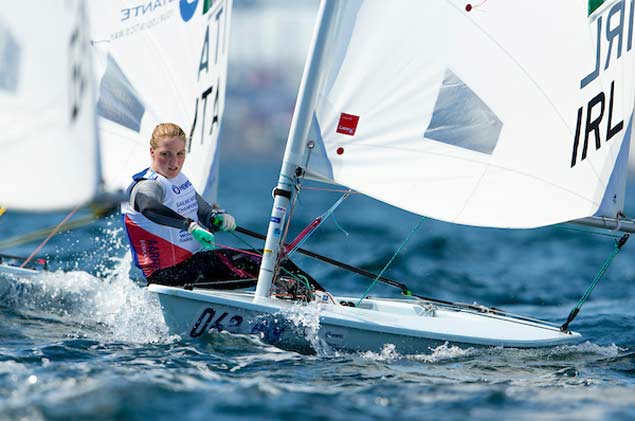 Aoife Hopkins -won today's race with a minute to spare Photo: Sailing Energy
Aoife Hopkins -won today's race with a minute to spare Photo: Sailing Energy
The race took place in light conditions following a long delay ashore waiting for wind. Hopkins started at the committee boat end of the line and enjoyed clear wind that allowed her to maintain a good position on the favoured side of the course.
"Hopkins lead at every mark on the course to win with more than a minute to spare"
While under pressure at times from Italy's Silvia Zennaro, Hopkins was able to establish a controlling position and held the lead at every mark on the course to win with more than a minute to spare.
The result moves her into 44th place overall with the possibility of a further two races to complete the Gold fleet series. However, a heavy thunderstorm at Aarhus saw racing postponed for the day.
Tokyo Laser Place Proves Elusive
Meanwhile, Finn Lynch of the National Yacht Club had a 46th place in the only Laser class race for the day before further racing was abandoned. His Black Flag disqualification from Tuesday's second race was also upheld so his overall standing in his Gold fleet is now 36th. A tenth race may yet be sailed but qualification for Tokyo 2020 is not a prospect for the Rio veteran who will have to wait for another opportunity to qualify Ireland.
Seaton & Guilfoyle Win Silver Fleet Race
The full Irish line-up was in action at various stages during the day despite the patchy conditions and competed in various Gold, Silver and Bronze fleets. Ryan Seaton of Ballyholme Yacht Club with Séafra Guilfoyle of the Royal Cork Yacht Club won the opening race of the 49er skiff class Silver fleet.
Due to the weather conditions, the racing schedule for Thursday is being extended to include Laser and Laser Radial Gold fleets for their remaining series races while the 49er skiff is already scheduled due to have three more races.
Irish Rio 2016 veteran Finn Lynch opened his Sailing World Championship series in the Laser dinghy class with a sixth place as he bids to qualify Ireland for a place in the Tokyo 2020 Olympics.
The National Yacht Club single-hander is competing in one of three flights of 55 boats each ahead of splits into Gold, Silver and Bronze fleets next week at Aarhus, Denmark.
In his second race of the day, Lynch hit the 'pin-end' mark on the starting line and was obliged to take penalty turns that left him behind the fleet and in dirty air. However, in an indication of his potential, he clawed back up the ranks to place 16th by the race finish.
"Liam Glynn had a tough start to his series"
Meanwhile, Lynch's rival for the Laser berth in Tokyo, Liam Glynn from Ballyholme Yacht Club, had a tough start to his series in the Laser class after a bad start and he placed 45th. However, he followed with a 22nd in race two and the forecast of light and shifty conditions - his preferred conditions - on Saturday is a prospect that he is relishing.
Ireland's Laser Radial women also started their series with Aoife Hopkins from Howth YC scoring 33rd and 35th in her 60-boat flight. Aisling Keller from Lough Derg YC had a 49th and 41st in the same group.
The single-handed Finn fleet had a gruelling day afloat as the class caught up on their missed race from Thursday and sailed three races for Day 2 of the event in slightly stronger winds of up to Force 4 in the afternoon.
Baltimore Sailing Club's Fionn Lyden started the day with a 14th place followed by a 28th place that he discards and then a 24th. He shares the Blue flight of 45 boats with Oisin McClelland of Donaghadee SC who had a 33rd (discarded) then a 23rd and a 28th for the day
The full Irish line-up of 14 sailors will be in action on Saturday when the 49er skiff event gets underway. Ireland is fielding four crews in the Mens' event that includes double Olympic veteran Ryan Seaton from Ballyholme, now sailing with Seafra Guilfoyle from the Royal Cork YC.
Also competing in the 105-boat 49er world championship event are Sean and Tadgh Donnelly of the National YC, Robert Dickson from Howth YC with Sean Waddilove from Skerries SC, Mark Hassett from Baltimore SC with Oisin O'Driscoll from Schull Harbour SC.
Annalise Murphy Opts Out of World Sailing Championships
Ireland's Olympic Silver medalist Annalise Murphy (28) will not contest August's World Sailing Championships in Denmark where 40% of Tokyo Olympic places are up for grabs.
Howth Yacht Club's Aoife Hopkins (19) will now automatically be offered Ireland's first Laser Radial place at the Danish event in Aarhus.
According to the Olympic Team Manager James O'Callaghan, the National Yacht Club ace has opted not to take the place as she decided she would not have enough time between finishing her Volvo Ocean Race (VOR) commitments and delivering 'a result she would be proud of'.
Last August, Murphy put her Tokyo plans on hold with the original intention of making the 2018 World Championships following the conclusion of the Volvo Ocean Race in June.
Murphy withdrew from the 2017 Radial World championships citing a knee injury sustained while sailing in Italy. She also withdrew from the Test Event in Aarhus in 2017 as a result of the same injury.
The Irish team for Aarhus is Finn Lynch in the Laser Standard, Hopkins in the Radial, and Ryan Seaton and Seafra Guilfoyle in the 49er. O'Callaghan expects Ireland could secure at least two Tokyo berths.
Subsequent to World Sailing's original allocation of nation places, Ireland applied for and has received extra places based on World Ranking points. Three further 49er skiff places have been granted and now there are places too both for Aisling Keller and Liam Glynn in the Laser classes.
Details of Ireland's Tokyo 2020 prospects are discussed in an Afloat.ie podcast with the team manager here.
Irish Laser Sailors Facing 'Tough' Test in Palma
Irish Olympic Laser campaigners Finn Lynch of the National Yacht Club and Liam Glynn of Ballyholme Yacht Club will face a fleet of 183 and all three Rio medallists when they start racing at a bumper 49th Trofeo Princesa Sofía Iberostar in Palma today, the first test of new Laser coach for Ireland, Vasilij Žbogar.
In a large turnout across the Olympic sailing classes for Ireland, previewed in full here, Aisling Keller in the Laser Radial will also meet Dutch 2016 gold medallist Marit Bouwmeester who took silver in London racing her first major regatta of this year.
'Racing kicks off at 11.00 today. 180 lasers entered! It should be a great week! says Lynch on the eve of the regatta while Glynn admits it's likely to be 'a tough week ahead racing 180 of the world's top sailors, but determined to start the racing season on a high'.
Following last year's post-Olympic entry of 634 boats and 842 sailors the expected spike in numbers continues an underlying upward trend. Entries last year were 10% ahead of where they were in 2013, that was immediately post London, and in 2017 were more than 20% ahead of 2009, post Beijing.
"The regatta this year is bigger than four years ago and so from the sports point of view is in a good position." highlights the event's manager Ferran Muniesa, "But the most important thing is what the sailors say to us all the time, that feel really comfortable at this event and that is important. They are our clients and we are seeking to give the best possible service to them."
The direct effects for the local economy are significant during tourism's realtively low season. A recent impact survey accounted for a income of around €4.5m to the local economy spread over the month prior to the event and during competition week.
Muniesa adds, " Long term locally what we really want is to show to the people of Mallorca and to the government of the Balearic Islands that this is an event which does a great promotion around the world for Mallorca and creates a significant impact - not only in terms of image but the economic impact is important because of course this happens low season. "
He adds, " From today we start the campaign to reduce the plastics and to educate and engage the sailors to tell them that they are the first ones that can set an example to everyone. That is why with our sponsors Iberostar and Marinepool and the Foundation One Earth One Ocean we are trying to see how we can help. This is a long term vision and this year we get started."
To sailors on all stages of their Olympic journey the lure of these Balearic waters remains as strong as ever. The event is renowned for pleasant sunshine, consistent, reliable spring breezes, excellent race management and it also holds the opportunity to put in several weeks of pre-regatta training in - usually - sunshine and a variety of winds.
With two years now until the 2020 Tokyo Olympics the 49th Trofeo Princesa Sofía Iberostar regatta is an almost essential fixture. No fewer than 17 sailing medallists who stood on the Olympic podium in Rio in 2016 will compete against dozens of previous Olympic medallists and World and European Champions. But the event is a fascinating melting pot where young talent can emerge and impress at one of their first big stage Olympic multi class events.
"It is wonderfully organised with a great atmosphere ashore but on the water there is a nice air of, well, anarchy. Here you often find loads of young guys and girls here to prove themselves and really push everything hard. And so for us, and others like us, this is always a chance to try new things, different equipment or tecniques, to work on things as for us the outcome is not critical." summarises the 2012 470 Olympic silver medallist Luke Patience with a trademark grin.
That said the 49th Trofeo Princesa Sofía Iberostar regatta marks the start of the journey for country qualification for Japan leading up to this season's World Championships of Aarhus.
The all time participation record sees eight regatta courses due to be operated across the Bay of Palma with starts and finishes almost continuously through each day. Target schedule for the Laser, RS: X and Finn is 10 races over in five days, while the Nacra 17, 49er and 49er FX have 15 races scheduled. Then, next Saturday, April 7, the decisive Medal Races for each classes should determine the overall podiums.
Who's Who? More than 20 Rio Medallists.....
In the Men's 470 Class Miami winners Patience and Chris Grube will be up against Australia's 2017 world champions and 2016 Olympic silver medallists Mathew Belcher and Will Ryan who won here two years ago and Rio bronze medallists Greece's Mantis Panagiotis and Pavlos Kagialis.
Rio gold medal winning helm in the 470 fleet Hannah Mills competes with Eilidh McIntyre with whom she finished runner up at the World Championship. Similarly France's Camille Lecointre who sails now with Aloise Retornaz won Olympic bronze in Rio.
British crews have achieved something of a domination in the 49er class even if medals have proven elusive at recent Olympics. Dylan Fletcher-Scott and Olympic 470 silver medal winning crew Stu Bithell are current world champions and won gold at the Sailing World Cup Miami in January. Germany's Olympic bronze medal winner Thomas Ploessel now races in a new partnership with Justus Schmidt. The young Spanish duo Diego Botin and Iago L. Marra finished runners up in Miami and were second here last year behind the British winners James Peters and Fynn Sterrit who sadly miss the chance to repeat their success because of a last minute injury to crew Sterrit.
In 49er FX the New Zealanders Alexandra Maloney and Molly Meech and the Danish duo Jena Mai Hansen and Katja Steen Salskov-Iversen start among the favourites. Maloney and Meech won Olympic silver in Rio while Hansen and Salskov-Iverson hold Olympic bronze from 2016 and lifted the world champions title in 2017.
The Finn class is perhaps one of the hardest to call. GBR's recently crowned European Champion Ed Wright is up against Rio gold and silver medal winners Giles Scott (GBR) and Caleb Paine (USA) along with the Swede Max Salminen who is world champion.
The Laser fleet is the biggest at the regatta with 183 registered boats and all three Rio medallists are racing here. Outstanding favourite appears to be Tom Burton, gold winner in Rio 2016, world championship runner up and the class winner at the Sailing World Cup Miami. Croatia's Tonci Stipanovic took silver in Rio and New Zealand's 2016 bronze medallist Sam Meech won the first of the 2018 Sailing World Cup events in Japan.
The Laser Radial class is 117 strong with the Dutch 2016 gold medallist Marit Bouwmeester who took silver in London racing her first major regatta of this year. She holds the aces as World and European Champion. Denmark's Anne Marie Rindom is the bronze medallist in Rio, winner of the first regatta of the 2018 Sailing World Cup and finished third here when she last raced in 2016. Great Britain's Alison Young, the 2016 world champion, comfortably triumphed at the Sailing World Cup regatta in January.
In the Nacra 17 the introduction of foils has opened up the class again forcing a new style of sailing to be learned. Argentines Santiago Lange and Cecilia Carranza, the Olympic champions in Rio 2016 are on that learning curve and have yet to replicate their Rio success on foils. World Champions are GBR's Ben Saxton and Nicola Boniface, the first world title winners on foils, who were sixth here last year. The Nacra 17 also features Austria's bronze medallists Thomas Zajac and Barbara Matz while Spain's Fernando Fernando Echávarri and Tara Pacheco are 2017 world championship runners up.
The men's boards are the only class in which none of the medallists of the last Olympic Games are present at the 49th Trofeo Princesa Sofía Iberostar. Poland completed the double last year when Pawel Tarnowski won the Men's RS:X, following up from his second in 2016. World Champion Bing Le leads a strong Chinese contingent as does Women's World Champion Pei Na Chen in the female fleet. Spain's London 2012 gold medallist Marina Alabau has finished fourth twice here.
The Trofeo Princesa Sofía Iberostar has signed a collaboration agreement with the One Earth - One Ocean foundation to help protect the oceans and coastal waters. The initiatives begin at this edition, by reducing the use of plastics and by collecting waste from the sea and the beach. In addition, the organization has distributed to all the on the water personnel and participating coaches a device to prevent of fuel and oil going in the sea from the RIB’s engine.


























